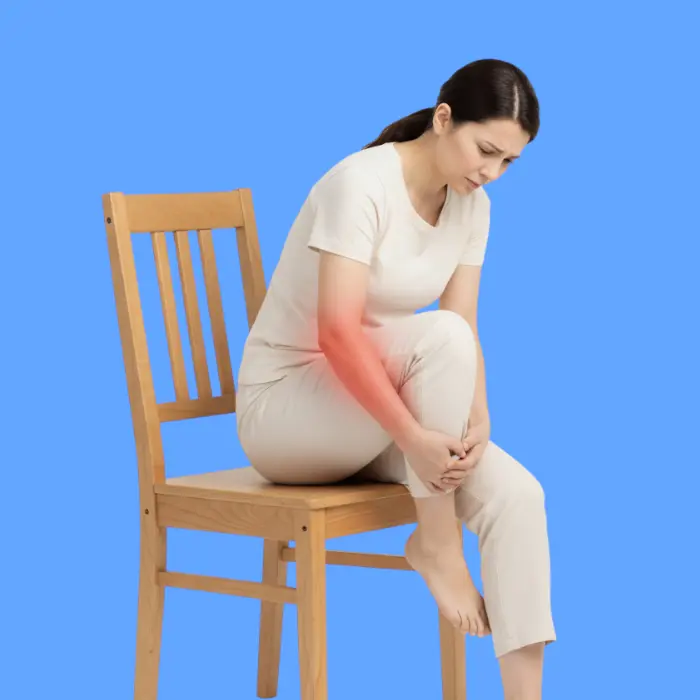what is herniated disc?
A herniated disc is a condition that affects the spine when one of the discs between the vertebrae slips out of its normal position and presses on nearby nerves.
This pressure can cause severe pain in the back or neck, and may extend to the limbs, affecting movement, sleep, and even the ability to perform daily tasks.
what are the causes of herniated disc?
There are several common causes of this condition, including:
- Lifting heavy objects incorrectly.
- Sitting for long periods in poor posture.
- Aging and loss of disc flexibility.
- Excess weight putting pressure on the spine.
- Weak muscles supporting the back.
- Sudden movements or sharp twists.
- Direct injuries or trauma to the back.
what are the common symptoms of herniated disc?

Patients may experience several common symptoms, such as:
- Sharp pain in the back or neck.
- Numbness or tingling in arms or legs.
- Muscle weakness and difficulty moving.
- Pain radiating from the back to the leg (sciatica).
- Increased pain when coughing or sneezing.
- Difficulty standing or sitting for long periods.
- Loss of balance or sensation in certain areas.
- Sleep disturbances due to persistent pain.
when should you see a doctor?
It is advised to consult a doctor urgently if any of the following occur:
- Persistent pain for more than two weeks without improvement.
- Loss of control over bladder or bowel.
- Severe weakness in limbs or difficulty walking.
- Sudden and intense pain after a minor movement.
- Continuous numbness in the pelvic or leg area.
- No response to home remedies or painkillers.
- Appearance of unusual new symptoms.
- Previous history of spinal problems.
what are the treatment options for herniated disc?
There are several treatment methods for this condition, including:
- Rest and avoiding strenuous movements.
- Using painkillers and anti-inflammatory medications.
- Physical therapy to strengthen back muscles.
- Hot or cold compresses to relieve pain.
- Stretching exercises under supervision.
- Local injections to reduce inflammation.
- Surgery in severe or advanced cases.
- Lifestyle adjustments to reduce spinal pressure.
can herniated disc be cured?
Yes, in many cases, recovery is possible without surgery, especially if diagnosed early and treated properly.
Recovery speed depends on the patient's age, severity of the condition, and adherence to treatment and medical advice. Some may need more time than others.
what are the prevention tips for herniated disc?
Here are some tips to help prevent the condition:
- Maintain a healthy weight to reduce back pressure.
- Exercise regularly to strengthen muscles.
- Avoid lifting heavy objects incorrectly.
- Sit in proper posture and use a comfortable chair.
- Take breaks during long work hours.
- Sleep on a mattress that supports the spine.
- Avoid sudden movements or sharp twists.
- Eat foods rich in calcium and vitamin D.
what are the possible complications of herniated disc?
Neglecting treatment may lead to complications such as:
- Permanent nerve damage.
- Chronic weakness in limbs.
- Loss of normal movement ability.
- Balance and walking problems.
- Bowel or bladder control issues.
- Chronic pain affecting quality of life.
- Need for complex surgical intervention.
- Progression to other spinal diseases.
frequently asked questions about herniated disc
Is herniated disc dangerous?
Yes, if neglected, it may lead to serious complications.
Can herniated disc be treated without surgery?
In most cases yes, especially if mild.
Does herniated disc affect sleep?
Yes, pain can disrupt sleep and comfort.
Does excess weight cause herniated disc?
Yes, it increases pressure on the spine.
article summary
Herniated disc is a common spinal condition that significantly affects quality of life, but it is treatable and preventable if managed properly.
It is important to recognize early symptoms, follow medical advice, and avoid harmful habits to ensure a healthy, pain free life. Awareness and serious management help avoid complications and offer a full recovery chance.